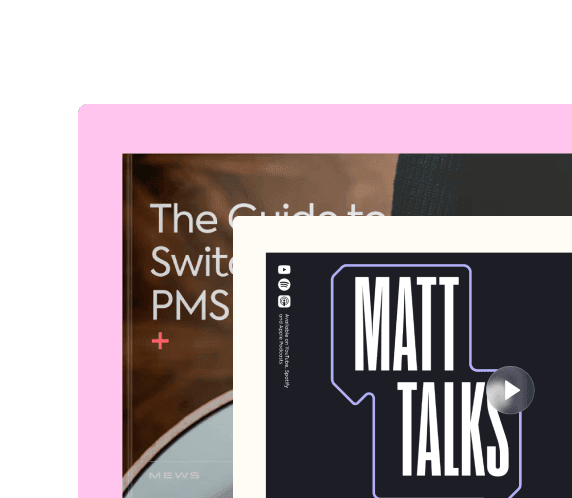Data analytics in the hospitality industry has come a long way. Hoteliers can now make real-time predictions and forecasts for demand and prices, creating more personalized guest offers and improving operational efficiency. Data analytics can also improve your marketing efforts.
Let's explore the potential of data analytics in hospitality and how it can help you provide better service and stay competitive. We'll show you how to achieve better results across the board, from revenue management to F&B, from marketing to human resources. There are even ways to optimize your whole supply chain.
What is data analytics in hospitality?
Data analytics in hospitality refers to collecting and analyzing data points from various sources to make more informed business decisions. Data can point you to the best ways to optimize operations, enhance customer experiences and improve your hotel's performance.
As a hotelier, you can track guest behavior to improve sales while unveiling purchase patterns and preferences. That way, you can better tailor your offers and ensure you're doing all you can to provide a seamless experience. Making better strategic decisions about marketing and prices will ultimately drive brand loyalty.

9 ways data analytics is helping the hospitality industry
Data analytics lies at the core of profitability. Success is intrinsically tied to data-driven decisions that are not only based on real-time findings but also designed to make forward-thinking choices that will help the longevity of your hotel.
Customer insights
Running a successful hotel means placing guest needs at the core of your product and service decisions. The first step? Analyze guest data to understand their preferences, behaviors and demographics. Using this information, you can personalize your offerings and services, create more targeted campaigns and positively affect customer satisfaction.
The more data you can leverage to understand guest profiles, the easier it will be to reach long-term success.
Marketing and campaign optimization
Now that you have the right customer insights, you can tailor marketing efforts to deliver the message across all buyer's journey stages. You can better understand which channels and strategies are working best and adjust spending accordingly, which is beneficial for return on marketing spend.
Fraud detection
In an industry dealing with copious amounts of sensitive data, hoteliers need to be aware of the dangers of data breaches and fraud. Data analytics lets you check transactions and detect any fraudulent activities. Improving security and minimizing the risk of fraud protects your guests and your reputation. Data can play a significant role in identifying unusual spending patterns and inconsistencies in financial transactions – flagging them accordingly.

Guest feedback analysis
Reputation management and guest reviews show how well your hotel is doing. Use them to find lapses in service and, if possible, find ways to improve. Analyzing guest reviews can help address concerns and respond accordingly. Using the data generated from your reputation management, you can prioritize improvements and ensure a consistent guest experience.
Predicting maintenance needs
Data analytics is surprisingly helpful when it comes to regular maintenance and predicting the equipment's lifespan. Whenever there's an issue, proactive repairs will minimize the downtime of any facility or equipment. The more regularly you maintain a hotel, the less chance you have of guest complaints.
Supply chain optimization
The hotel industry relies heavily on the supply of goods for restaurants, laundry services, cleaning supplies, bedding, towels and sheets. You need to be able to control inventory levels, supplier relationships, and distribution processes. Enter data analytics. Now, you can avoid staying out of supplies, especially during periods of high demand.
Did you know you can optimize costs from within your PMS? It's all possible – from making data-informed ordering decisions to real-time inventory reporting. You can ensure everything is running smoothly regardless of occupancy levels.
Revenue management
In no area of your hotel is data analytics more important than revenue management. You can better manage inventory and pricing strategies while making decisions that will maximize your revenue. You can analyze historical data and market trends and look at competitor pricing.
Accurate benchmarking will help you make better pricing decisions, keeping you competitive.
Dynamic pricing models can automatically adjust rates according to demand and the market. Experiment with yield management, especially during times of high demand.
Forecasting
Forecasting is another area where data analytics helps hoteliers excel. Use it to get a deeper understanding of demand, staffing needs and inventory management. When it comes to strategic long-term decisions, it can help reduce costs and optimize planning, ultimately boosting your hotel’s bottom line. By using analytics to forecast guest behavior, your revenue manager will have the tools they need to offer the right services at the right time and the right price.

Food and beverage
Are you struggling with ordering the right amount of food? Beyond inventory for the F&B department, you can use data to analyze buying trends and preferences. Based on demand, you can calculate what percentage of guests will dine in and better predict how many staff members you'll need at any time.
Analyzing this information will help you understand whether you need to run special promotions or marketing campaigns to incentivize consumption at the hotel and restaurant. The more information you have about guest patterns, the easier it is to increase sales from the F&B department.
Conclusion
Data analytics in hospitality helps hoteliers make data-driven decisions that boost efficiency. Use it to improve the customer experience and drive profitability by accurately forecasting demand. It also gives your F&B department the necessary data to make optimal purchasing decisions. Furthermore, you can better manage staffing needs, finding the right number of people depending on the number of guests.
Effective strategies around data generate impressive cost savings and revenue growth. But the best part is that they help you deliver personalized experiences that keep guests loyal.
Written by

Eva Lacalle
Eva a plus d’une décennie d’expérience internationale dans le marketing, le marketing numérique, la communication et l’événementiel. Lorsqu’elle ne travaille pas, elle aime surfer, danser ou explorer le monde.










